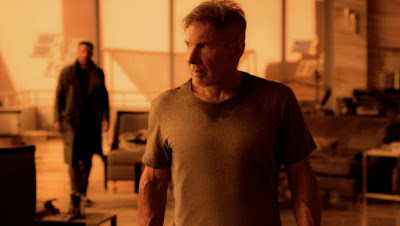Tuesday, 10 October 2017
Blade Runner 2049 Review
Re-watching a film right before a sequel is sometimes a bad decision. On the one hand it ensures you're up to speed with everything that's happened before jumping back into the franchise's world again. On the other hand it means there's more opportunity to draw comparisons and discrepancies. I don't regret re-watching Blade Runner before going to see 2049, but unfortunately for me it meant 2049's validity was put into question almost immediately when the entire premise of the original - that replicants can only live for four years - became superfluous in 2049's opening crawl, stating the Nexus 8 generation of replicants (somehow created around the time the first film look place) have no live span. And once you start to question the validity of a film's continuity the suspension of disbelief is hard to get back.
So when K's (Ryan Gosling) investigation into the bones he discovers hidden by another older model replicant indicates the robot had carried to birth a child you have to just take a breath and go along for the visually breathtaking ride and not think too hard about it. That's a shame though, because much like the original, there are some interesting ideas here, about identity, memory, morality and love but they get lost in translation. Instead of pondering these themes you're trying to uncover 2049's puzzling mystery: who is the child to the replicant and the human, and why does everyone want it so badly? It's a welcome addition to the more straight-forward narrative of the original, but again, there's too much going on to fully enjoy it - which is really quite a feat for a film you can also describe as slow-paced.
Gosling is fine, but he's outshone by the late arrival of Harrison's Ford's Deckard, and he basically suffers from the same problems Harrison had with Deckard in the first film but in reverse. Ford had to play a human that you could potentially believe was a robot, whereas Gosling must play a robot that you just might think is human. Ana de Armas and Robin Wright both perform well, but their characters are mostly unnecessary filler, particularly Armas's Joi whose hologram characters existence confuses me. Sylvia Hoeks is the standout as the beautifully menacing replicant Luv, assistant to the underused Jarrod Leto's Wallace, head of the Wallace Corporation.
If you liked the first film, it's highly likely you'll enjoy 2049 even though it's a highly more convoluted version of the original.
Subscribe to:
Comments (Atom)
